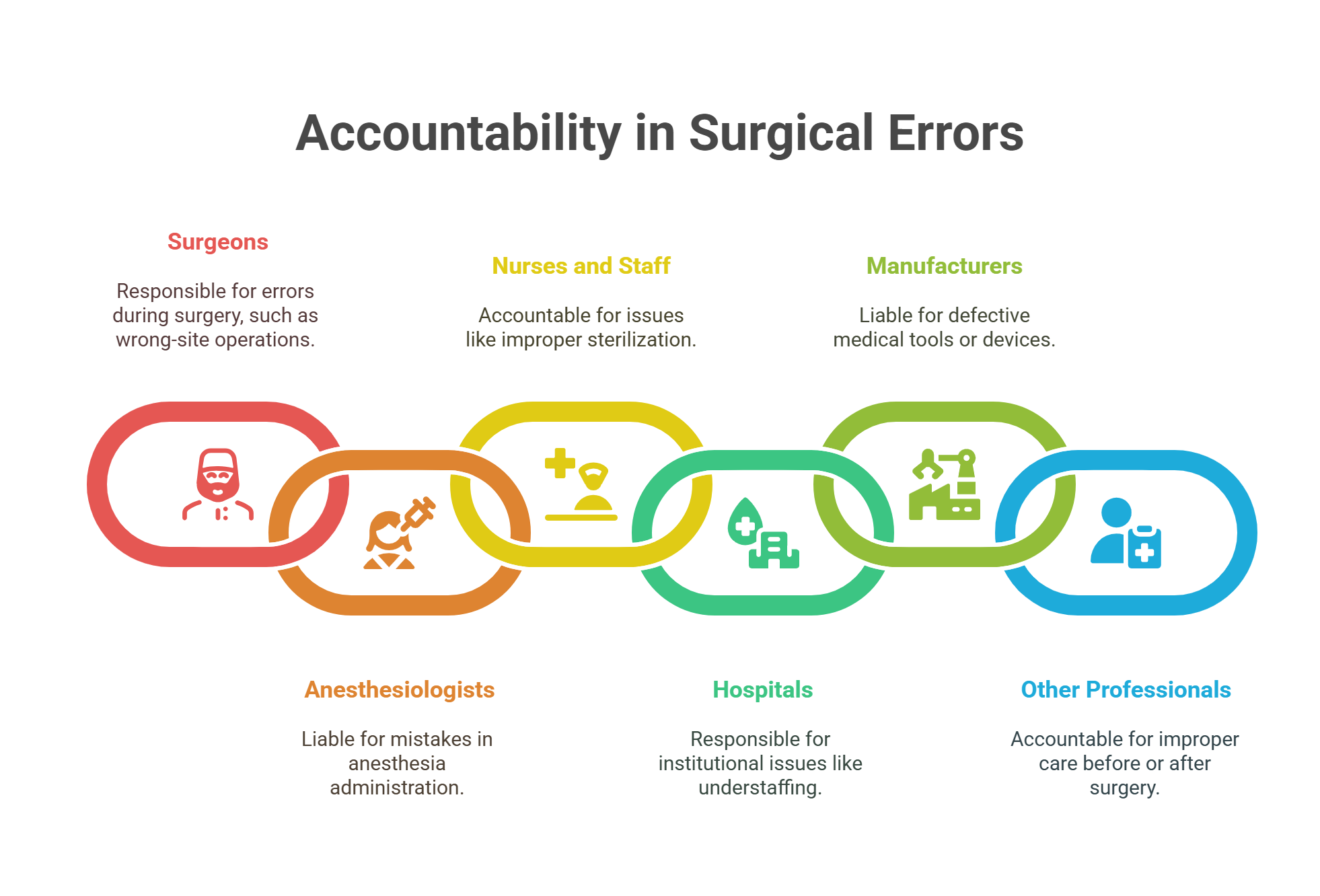
Surgical mistakes can turn routine procedures into life-altering tragedies. If you believe a preventable error happened in the operating room, you deserve answers—and legal support. At Frank Spector Law, our Maryland surgical error lawyer helps families across the state pursue justice and financial recovery after medical negligence.
From operating rooms in Baltimore to outpatient clinics in Silver Spring, no patient should suffer due to a doctor’s inattention, poor planning, or avoidable mistake. Our firm investigates surgical errors and holds negligent hospitals and providers accountable.
We’ve secured substantial settlements for injured clients:
- $5,000,000: Awarded a $5 million settlement for injury during surgery in Baltimore.
- $3,000,000: for a child injured during surgery in Montgomery County.
- $1,000,000: A policy limit settlement in Western Maryland for surgical error.
Injured due to a surgical error? Contact us for a free consultation with our experienced Maryland surgical error lawyers today!
What is Classified as a Surgical Error?
A surgical error is a preventable mistake that occurs before, during, or after an operation and falls outside the scope of what is medically acceptable. While every surgery carries some level of inherent risk, not all negative outcomes qualify as malpractice. Surgical errors are different from expected complications because they involve a failure to follow the appropriate standard of care.
Medical professionals are expected to act with a reasonable degree of skill, caution, and precision. When a surgeon operates on the wrong site, leaves instruments inside the patient, administers incorrect anesthesia, or fails to monitor the patient properly, those actions may constitute surgical error. These mistakes often occur due to poor planning, fatigue, communication breakdowns, or inattention—all of which are preventable with proper care.
To qualify as medical malpractice, the error must represent a deviation from what another competent healthcare provider would have done under similar circumstances. Our lawyers help clients determine whether their outcome was an unfortunate complication or a legally actionable surgical mistake.
Do You Have a Case?
Determining if you have a valid Maryland medical malpractice claim depends on meeting specific criteria. Here are the key points we will establish:
- Duty of Care: Medical professionals are responsible for providing care that meets accepted standards. This duty extends to everyone involved in your procedure, including surgeons and anesthesiologists.
- Breach of Duty: A breach occurs when a healthcare provider fails to meet the required standard of care. Examples include leaving surgical tools inside the body, performing unnecessary operations, or ignoring proper protocols.
- Causation: We must prove that the medical error directly caused your injury. For example, complications or additional procedures must be clearly linked to the provider’s negligence.
- Damages: Your claim must show measurable losses, such as increased medical bills, missed work, physical pain, or emotional distress.
Our Maryland surgical error lawyers will evaluate your case, gather evidence, and guide you through the legal process to help you seek the compensation you deserve.
Damages You Can Recover
Who Can You Hold Liable?
How to Get in Touch With Our Maryland Surgical Error Attorney
Starting your claim is simple, and we’re here to help every step of the way. Take advantage of our free consultation to discuss your case and explore your legal options. You can reach us through any of these convenient methods:
- Call Us: Speak with a member of our team directly at 443-331-2686.
- Online Contact Form: Share the details of your case using our easy-to-use form, and we’ll respond promptly.
- Email: Reach out to Frank anytime at frank@frankspectorlaw.com for personalized assistance.
Don’t wait to get the help you need. We are ready to guide you toward the compensation you deserve.
How Our Surgical Error Lawyer in Maryland Will Help
When you’ve suffered due to a surgical mistake, having an experienced legal team on your side can make all the difference. Our surgical error lawyer in Maryland will guide you through every step of the process, fighting for the compensation and accountability you deserve.
- Tracking legal deadlines: We monitor all applicable filing deadlines to protect your right to pursue a claim before time runs out. Missing the statute of limitations—even by a day—can permanently bar your case.
- Gathering evidence: Our team obtains your complete medical records, consults with independent surgical experts, and carefully documents every detail. This helps us build a compelling case that’s ready for settlement negotiations or court.
- Identifying all liable parties: We look beyond the surgeon to determine who else may be responsible, including nurses, hospitals, anesthesiologists, or device manufacturers. Many surgical errors involve team failures, not just individual mistakes.
- Dealing with insurers and defense teams: We communicate directly with insurance adjusters and defense lawyers so you don’t have to. Our firm fights to counter lowball offers and delay tactics with clear, evidence-backed demands.
- Calculating full damages: We work with economists and medical specialists to assess your long-term costs—lost income, future care, and pain and suffering. Our goal is to recover every dollar you’re entitled to.
- Guiding you through the legal process: From investigation to resolution, we make sure you understand what’s happening at each stage. Our lawyers provide consistent updates and strategic advice, so you’re never in the dark.
The Legal Process For a Surgical Error Lawsuit
Pursuing a surgical error lawsuit may feel overwhelming, but you don’t have to go through it alone. Our legal team handles every step of the process so you can focus on your recovery and your future:
- Free consultation and case evaluation: We’ll start by listening to your story and reviewing your initial medical records. If we believe your case has merit, we’ll explain your legal options and the next steps.
- Evidence collection and expert analysis: We gather surgical records, operative reports, imaging, and other documentation. We also work with independent medical experts who help us evaluate whether the standard of care was violated.
- Filing your claim: Once we’ve built a strong case, we file a formal legal complaint against the responsible party or parties. This step initiates the legal action and puts them on notice.
- Discovery and pretrial motions: During this phase, both sides exchange information, question witnesses under oath, and submit legal arguments. We use this time to strengthen your position and prepare for potential settlement or trial.
- Negotiation or trial: Many surgical error cases settle before trial, but we’re fully prepared to present your case in court if necessary. Whether negotiating with insurers or arguing before a jury, our focus remains on maximizing your compensation.
Types of Errors Our Surgical Error Attorney in Maryland Handles
We handle every type of surgical error case, no matter how complex. Below are some of the most common mistakes our clients have experienced—each of which can lead to serious harm if not addressed properly.
- Wrong-site or wrong-patient surgery: This occurs when a procedure is performed on the wrong body part or person. It’s one of the most egregious and preventable medical errors.
- Retained surgical instruments: Sponges, tools, or clamps left inside a patient after surgery can lead to infection, pain, or the need for additional surgeries.
- Nerve damage or internal bleeding: Poor surgical technique or lack of caution near sensitive structures can cause permanent nerve injury or life-threatening hemorrhage.
- Anesthesia errors: Administering the wrong dose, failing to monitor vitals, or not accounting for allergies can lead to brain damage or death.
- Postoperative infections: Infections often result from improper sterilization or failure to monitor wounds. Left untreated, they can lead to sepsis or extended hospital stays.
- Foreign object left inside patient: Items mistakenly left in the body may go undetected for months and cause long-term complications.
- Surgical fires or equipment malfunctions: Although rare, these incidents are devastating and usually stem from preventable safety lapses in the operating room.
- Delayed response to complications: When a patient’s distress is ignored or not recognized after surgery, it can lead to irreversible injury or death.

Your First Steps Once You Suspect Surgical Error
If you believe a surgical error has occurred, taking the right steps immediately is best for protecting your health and strengthening your case. Follow these straightforward steps:
- Seek Medical Attention Immediately: Consult a trusted medical professional to address complications and prevent further harm. Getting a second opinion can confirm the error and guide corrective treatment.
- Consult Our Maryland Surgical Mistake Lawyers: Our experienced attorneys are here to help. We’ll review your case during a free consultation, handle negotiations and paperwork, and ensure your claim is filed correctly. You can focus on your recovery while we take care of the legal process.
- Obtain Your Medical Records: Request all records related to your surgery, including preoperative and postoperative notes. These are essential for identifying errors and supporting your claim and we can request these on your behalf.
- Avoid Speaking With Insurance Companies: Don’t discuss your situation with insurance adjusters or hospital representatives without consulting our lawyers. They may try to minimize your claim or use your statements against you.
- Document Symptoms and Treatments: Keep a log of your symptoms, treatments, and any follow-up procedures. Photos of physical injuries can also help build a strong case.
- Track Financial Losses: Maintain records of all expenses related to the surgical error, such as medical bills, lost wages, travel costs, and caregiving expenses.
- Limit Social Media Activity: Avoid posting about your condition or case online. Insurers often monitor social media and may use your posts to challenge your claim.
- Save Communication Records: Keep any emails, texts, or letters from healthcare providers or insurers. These can serve as valuable evidence in your case.
- Gather Witness Accounts: If family or friends witnessed your condition before and after the surgery, their statements can further support your claim.
Frank and his team understand that the post-surgery timeframe can be incredibly traumatic, which is why they will support you through the above processes as much as possible!
Insurance Company Tactics to Watch Out For
After a surgical error, insurance companies often step in quickly, but not always to help you. Their goal is to protect their bottom line, not to ensure you’re fairly compensated. That’s why many injured patients are met with tactics designed to minimize or deny their claims.
Insurers may delay processing your case, hoping you’ll give up or settle out of desperation. They might downplay the severity of your injury, question whether a true error occurred, or pressure you into accepting a low settlement before you’ve had time to understand the full extent of your losses.
✔️ Our firm deals with these tactics head-on. We handle all communication with the insurance companies so you don’t have to, and we build strong, evidence-backed demands that reflect the true value of your case. With our surgical error lawyer on your side, you won’t have to face them alone—or accept anything less than what you deserve.
Remember that insurance companies are NOT on your side. Let us fight them on your behalf!
Maryland Statute of Limitations
If you’ve experienced a surgical error or other form of medical negligence in Maryland, it’s essential to act quickly due to Maryland’s strict statute of limitations for filing a medical malpractice case. Under state law, you must file a medical malpractice lawsuit within:
- Five years from the date the surgical error occurred or
- Three years from the date you discovered the error, whichever comes first.
Failing to meet this deadline could result in losing your right to pursue compensation, even if your case is strong. This timeframe applies to errors such as wrong-site surgery, operating on the wrong patient, or removing the wrong body part during a surgical procedure.
Our experienced medical malpractice attorneys can help ensure your case is filed on time and meets all legal requirements. A malpractice lawyer will review your situation, consult medical experts, and determine whether the personal injury was caused by negligence.
Evidence Needed For Your Case
Building a case for a surgical error starts with collecting key evidence to support your claim. Here’s what you should focus on:
- Medical Records: Request copies of all relevant records, including pre- and post-surgery notes. These will help identify where and how the mistake happened.
- Second Medical Opinions: Get another healthcare professional to assess the impact of the surgical error. Their evaluation can provide strong support for your case.
- Photos or Videos of Injuries: Capture any visible injuries or physical changes caused by the error. Visual proof can make your claim more compelling.
- Personal Notes or Journals: Write down details about your symptoms, treatments, and how the error has affected your daily life and emotions. This paints a clearer picture of the harm you’ve endured.
- Bills and Receipts: Keep track of all costs, such as medical bills, therapy expenses, and out-of-pocket charges. These are key for calculating financial losses.
- Witness Statements: If family members or others are aware of your condition or saw how the mistake affected you, their accounts can add credibility to your claim.
Dealing with these steps while recovering from a surgical mistake can feel overwhelming. That’s where we come in—we will gather as much evidence on your behalf as possible so you (or your loved one) can focus on getting better.

Attorney Fees
We understand that financial worries are often a significant concern after suffering from a surgical error. That’s why our law firm works on a contingency fee basis for medical malpractice cases. This means:
- You pay nothing upfront.
- We only get paid if we win your case.
- Our payment is a percentage of the compensation we recover for you.
This approach ensures that you can focus on your recovery without the stress of out-of-pocket legal fees. Whether your case involves medical expenses, lost income, or emotional damages, we are here to fight for the compensation you deserve—at no financial risk to you.
Who pays for medical bills while your case is pending?
After a surgical error, the medical bills can pile up fast, especially if you need corrective procedures, physical therapy, or long-term care. In most cases, your private health insurance, Medicare, or Medicaid may cover some of these costs while your lawsuit is ongoing. However, they often don’t pay everything upfront, and you may still receive bills for deductibles, co-pays, or uncovered services.
If bills remain unpaid, healthcare providers may place medical liens on your settlement. This means they reserve the right to be reimbursed from your eventual compensation. While this is a common part of personal injury claims, it can create financial stress if not managed properly.
That’s where our legal team steps in. We help coordinate with hospitals, billing offices, and lienholders to delay collections, negotiate reductions, and protect your financial stability. Our goal is to ensure you get the care you need, without being overwhelmed by costs before your case is resolved.
Why Choose Us Over Another Surgical Errors Lawyer in Maryland?
After experiencing a surgical error, it’s necessary to have legal representation that combines skill, compassion, and determination. At Frank Spector Law, we go beyond the basics of legal assistance to provide personalized support and dedicated advocacy.
Here’s what sets us apart:
- Decades of Proven Experience: With more than 30 years of handling medical malpractice claims, including difficult surgical error cases, we’ve built a strong reputation for securing favorable outcomes. Our experience gives us the insight needed to handle even the toughest cases with confidence.
- Support When You Need It Most: We know that surgical mistakes don’t just affect your body—they can also impact your emotional well-being. Our team is here to provide compassionate guidance and support, making the legal process as stress-free as possible.
- Individualized Focus on Every Client: No two cases are the same, and we treat each client with the attention they deserve. We’ll take the time to understand your unique circumstances and craft a strategy that aligns with your specific needs and goals.
- Specialized Medical and Legal Knowledge: Surgical error claims often require a deep understanding of medical procedures and standards. Our expertise in both law and medicine allows us to uncover critical details and build a compelling case on your behalf.
- A Track Record of Results: Our commitment to achieving justice for our clients has led to numerous successful settlements and verdicts. Whether negotiating or litigating, we’re driven to fight for the compensation you deserve.
Frank Spector: Your Wrong Site Surgery Lawyer in Maryland

I am dedicated to helping victims of medical malpractice, including surgical errors, achieve justice. With over 30 years of experience and recognition in Maryland Super Lawyers Magazine for medical malpractice, I bring a proven track record and a strong reputation in the legal community:
- “Superb” rating on Avvo
- Selected to Super Lawyers: 2008 – present
- Verified Justia profile
- Verified D.C. Bar member: 1993 – current
I have successfully handled cases involving surgical errors, such as injuries during heart procedures like cardiac catheterizations and angiograms. One notable case involved securing a $1.3 million verdict for the family of a woman who tragically passed during a heart filter procedure at Union Memorial Hospital.
While every case is unique, my experience and dedication to my clients speak for themselves. If you’ve suffered harm due to surgical negligence, don’t wait. Schedule a free consultation today to protect your rights and ensure your claim meets all legal requirements.
Surgical errors include wrong-site surgery, anesthesia mistakes, and more. Contact me today for a free consultation and let us help you seek justice!
Main Causes of Surgical Errors
Awareness of why surgical errors can occur is necessary for identifying accountability and preventing future mistakes. Below are the primary causes of surgical malpractice:
- Lack of Preparation: Failure to review the patient’s medical history or plan adequately before surgery increases the risk of injury.
- Communication Failures: Miscommunication between surgical team members can lead to wrong-site surgery, incorrect procedures, or other serious errors.
- Fatigue: Surgeons and medical staff working long hours are more prone to making mistakes.
- Inexperienced Medical Staff: Lack of medical knowledge or inadequate training can result in improper procedures or equipment use.
- Negligence During Surgery: Errors such as improper sterilization, failure to follow protocols, or mishandling of instruments can result in infections, tissue damage, or worse.
- Faulty Equipment: Malfunctioning surgical tools or devices can lead to a botched surgery or unexpected complications.
When errors happen due to another’s negligence, it’s important to act quickly. Victims have the right to file a surgical error lawsuit and seek compensation with the help of an injury attorney.
If the injury was discovered long after the surgery, you may still have a window to file a claim for surgical malpractice in Maryland.
Consequences of Surgical Errors
The consequences of a surgical error can be devastating, both physically and emotionally.
In the short term, patients may experience severe pain, infections, internal bleeding, or unexpected complications that require additional surgery. In more serious cases, these errors can cause permanent damage to vital organs, nerve injuries, paralysis, or even loss of mobility or limb function.
Long-term effects may include chronic pain, scarring, long-term disability, and disfigurement. Some patients are left unable to return to work or care for themselves, while others may face life-altering conditions like traumatic brain injury or permanent internal damage. In the most tragic situations, surgical mistakes can lead to wrongful death.
Beyond the physical impact, surgical errors can carry a significant emotional and financial toll. Patients and families often face anxiety, loss of independence, and depression as they adjust to a new reality.
At the same time, they may be dealing with mounting medical bills, lost income, and uncertainty about the future. Our firm works to hold negligent providers accountable so you can focus on healing—both physically and financially.
Myths vs Facts About Surgical Errors
There’s a lot of confusion surrounding surgical errors and medical malpractice claims. Misunderstandings can prevent patients from pursuing valid cases, or lead them to accept less than they deserve. Let’s clear up some of the most common myths:
Myth #1: “If something goes wrong, it’s always malpractice.”
Fact: Not all surgical complications are the result of negligence—only when the provider fails to meet the accepted standard of care.
Myth #2: “Signing a consent form means I can’t sue.”
Fact: Consent forms acknowledge risks, but they don’t excuse preventable mistakes or protect doctors from liability.
Myth #3: “Hospitals will admit fault if it’s serious.”
Fact: Hospitals and insurers rarely accept responsibility without being challenged by an experienced legal team.
Myth #4: “I can wait until I recover before filing.”
Fact: Every state has strict time limits for filing medical malpractice claims. Waiting too long could forfeit your rights.
Myth #5: “Only the surgeon can be held accountable.”
Fact: Nurses, anesthesiologists, surgical techs, and the hospital itself may also share legal responsibility.
Myth #6: “It’s too expensive to hire a lawyer for this.”
Fact: Our firm works on a contingency basis, so you pay nothing unless we win your case.
When Do Surgical Errors Become Medical Malpractice?
A surgical mistake must meet specific legal criteria for it to be considered malpractice.
A surgical error qualifies as medical malpractice when the healthcare provider fails to deliver the expected standard of care. This standard refers to the quality of care that another surgeon with similar training and experience would have provided in the same situation. If the actions—or inactions—of the provider fall below this standard and cause harm, they can be held accountable.
The central question is whether a reasonably skilled surgeon, under the same circumstances, would have avoided the error and the resulting harm. If the answer is yes, the provider’s actions may be deemed negligent, making the case eligible for a medical malpractice claim.
At Frank Spector Law, we focus on answering this important question. Our surgical malpractice lawyers review the details of your case, consult medical experts, and determine whether the error meets the criteria for malpractice. If you’ve experienced a surgical injury, contact us for a free consultation to understand your legal options and seek compensation for your losses.

What About Informed Consent?
Before surgery, patients typically sign an informed consent form. This document confirms that your doctor has explained the procedure’s potential risks, benefits, and alternatives.
For example, risks may include bleeding or infection, while benefits might involve pain relief or improved mobility. Alternatives, such as not undergoing surgery, should also be outlined.
Signing informed consent does not prevent you from filing a medical malpractice claim if negligence occurs. The form acknowledges that you were informed about the risks, but it does not shield a surgeon from responsibility for mistakes caused by carelessness or substandard care.
Even with informed consent, you may still have a valid case if a surgeon acted negligently, made an avoidable mistake, or failed to meet the expected standard of care. If you believe your injury was caused by negligence, contact us for guidance.
Speak to a Maryland Surgical Mistake Lawyer Today!
Contact us today for a free consultation. You can reach us by:
- Telephone: Call us directly at 443-331-2686 to speak with a lawyer in Maryland.
- Contact Form: Take a few minutes to view our online contact form and provide details about your case.
- Email: You can also send an email to frank@frankspectorlaw.com at any time.
Our Maryland medical malpractice lawyers are here to offer support to anyone in need!

